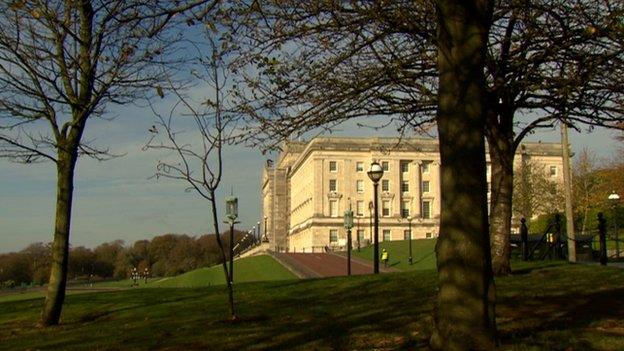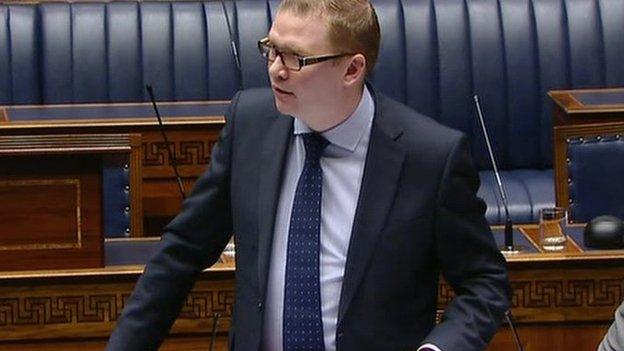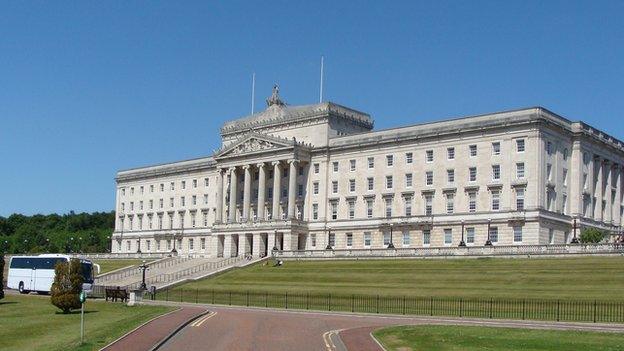Finance minister: Political parties are 'very close to a deal' on Stormont budget
- Published

If the draft budget is not agreed by Friday, Stormont will lose out on a £100m loan from the Treasury
The Finance Minister Simon Hamilton has said political parties are "very, very close" to a deal on the Stormont budget.
Ministers are meeting on Thursday to discuss a draft document on the executive's finances for 2015/2016.
If the draft budget is not agreed by Friday, Stormont will lose out on a £100m loan from the Treasury.
Mr Hamilton told BBC One's Nolan show he believed "a couple of hours' work" would finalise the details.
The finance minister has proposed cuts in his draft budget paper.
He said: "We have been working constructively, working positively and I think we are in the position where by the time the executive meets tomorrow afternoon we will have a deal in place."
Parties have been negotiating over the allocation of funds to the executive departments.
The Finance Minister said there would be a "significant degree of protection" for the health budget and also indicated that the Departments of Education and Enterprise, Trade and Investment would be prioritised.
On Wednesday, Sinn Féin executive minister Michelle O'Neill has said "progress was being made" in budget negotiations.
Ulster Unionist leader Mike Nesbitt has warned that if Northern Ireland parties give up on getting a budget deal they "might as well give up on devolution".
Alliance minister Stephen Farry has said there is "a reasonable prospect" of the draft budget for Northern Ireland being agreed by Friday.
Mr Farry has said any deal must be sustainable.
Sinn Féin minister Michelle O'Neill has also said she is hopeful that agreement can be reached and that "progress is being made" in negotiations.
The Department of Enterprise, Trade and Investment and the Department of Health and Social Services would get more money next year under the draft budget proposals.
The biggest losers would be the Departments of Culture, Arts and Leisure; Employment and Learning; and Environment.
Each is facing budget reductions of almost 13%.
Ulster Unionist minister Danny Kennedy whose Department for Regional Development is facing a 4% cut in its budget said more talks were needed before he could gauge a "definitive outcome".

Simon Hamilton said next year's budget is "the most challenging the executive has ever faced"
On Tuesday, Employment Minister Stephen Farry said the impact of the proposed cut to his department would be "severe".
He said it would amount to a "four figure reduction" in places in each of the Northern Ireland universities under the current proposals and "many thousands of places being lost within further education".
Reductions
"It will seriously limit our ability to invest in skills, that is the key driver of the transformation of our economy," he added.
On Wednesday, Gerry Campbell, chief executive of Colleges Northern Ireland, said it was "absolutely vital" that 16-19 year olds in further education are protected "in the same way" as those being educated in "school settings".
"In a scenario where schools' budgets are ring-fenced, failure to protect funding for young people in further education or other forms of training not only creates an inequality for those young people, but risks fracturing the skills pipeline," he added.
Mr Hamilton has said next year's budget is "the most challenging task this executive has ever faced".
He has suggested the Department of Health receives an additional £200m for front line services. However, other areas within the department's responsibilities, such as the fire service, would be subject to cuts.
Sinn Féin has said it will have further discussions on the budget paper circulated by the finance minister.
Northern Ireland Secretary Theresa Villiers has said the job of resolving budget questions would be taken from the Stormont parties, unless they agree a draft budget by the end of the month.
Ms Villiers said that while there was some flexibility in the process of consultation, it was crucial the parties stuck to the timetable.
- Published28 October 2014

- Published27 October 2014

- Published27 October 2014

- Published27 October 2014
